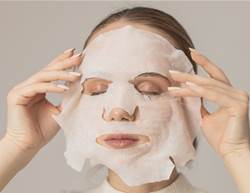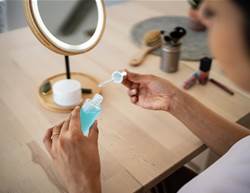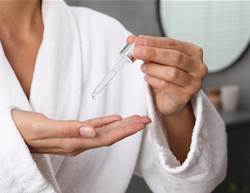While you hear so much about hot flushes, insomnia and mood swings, a more unexpected side effect of menopause is how it can change your skin. By understanding what happens to your skin and why, along with our expert advice, you’ll have the tools to ensure you look after your skin and maintain a glowing complexion – and not just because you can’t stop hot flushing.
Ask the experts...
What causes the skin to develop wrinkles?
It’s a sobering fact that during the first years of menopause, you lose about 30 per cent of your collagen (which is what keeps the skin looking plump), and it continues to decline about 2.1 per cent every postmenopausal year for a period of 15 years, says Dr Shyamalar Gunatheesan, a Melbourne based dermatologist and Fellow of the Australasian College of Dermatologists. Of course, genetics and environmental factors, such as sun damage, also play a role. But the loss of collagen, and elastin and moisture, are the big three changes making skin dryer and thinner. The good part? To some degree, you’re now able to address these changes with effective skincare.
Why is my skin so dry?
If there’s one main thing menopause does to your skin, it’s sap the moisture, says Dr Gunatheesan. “This is because oestrogen, one of the main hormones that depletes during menopause, traps water and plumps the hydration of your skin,” she explains. “A greater water content boosts your skin thickness and your levels of ‘natural moisturising factors’ (which equates to how well your skin holds water).” As oestrogen declines, your dermal water content does too, resulting in skin that’s dehydrated and less elastic, with more noticeable fine lines and wrinkles.
What's the deal with the sudden sensitivity?
If products you normally use become irritating, or your skin is looking red or feeling hot and prickly, you’re not alone. “I was suddenly unable to use any products containing ‘actives’ without breaking out and feeling sensitised,” says Mukti, founder of skincare brand Mukti Organics, who experienced severe sensitivity in perimenopause. (She consequently created her Calming range to help women with similar issues.) You can blame hormonal fluctuations for this sensitivity – it lowers your pain threshold and, in extreme cases, even light touch can feel painful. “The depletion of oestrogen and loss of progesterone can affect the severity of rosacea,” adds Dr Gunatheesan. This is especially the case if it’s something you’re prone to. The dryness of menopausal skin also impairs wound healing; you may find that you bruise more easily and don’t heal from cuts or abrasions as quickly as you used to. “You have to remember that your skin is your largest organ,” says Dr Gunatheesan. “It does so much for you – it’s carried you through. By the time menopause hits, you have the wisdom and the knowledge to do something about it.”





.jpg&h=193&w=250&c=1&s=1)



